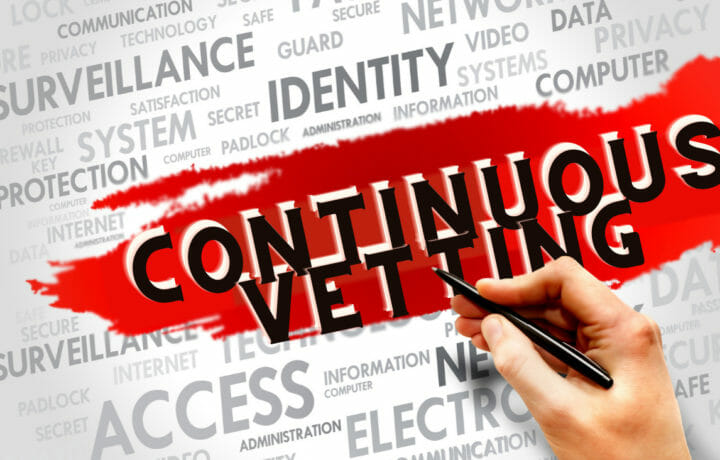The government’s Continuous Evaluation or Continuous Vetting (CV) program is headed for full implementation. Earlier this year the Defense Counterintelligence and Security Agency announced its plans to enroll all security clearance holders within its purview into the program by the end of the year. Based on updates provided at last week’s NCMS Seminar, it should be able to do so.
CV is a cornerstone of the government’s Trusted Workforce 2.0 initiative, with the aim of eliminating or adjusting the need for Periodic Reinvestigations (PRs), and identifying issues that weren’t uncovered in an investigations process that only looks into issues once every five or 10 years. DCSA noted it currently has 940,000 industry security clearance holders enrolled in CV – that’s up from 675,000 industry applicants who were enrolled when DCSA updated the spring meeting of the National Industrial Security Program Policy Advisory Committee (NISPPAC). With approximately 1 million total cleared DoD/industry clearance holders, that leaves just 60,000 industry clearance holders who have yet to be enrolled into the program.
All new security clearance applicants are automatically enrolled into CV. The applicants who remain to be enrolled may represent individuals with out of scope investigations – a requirement of CV is for DCSA to have an SF-86 that is current, or post 2010. Some individuals who obtained their initial Secret or who’s last PR was more than 10 years ago may not have a current SF-86 on file and will need to complete a new one prior to enrollment.
The Only Thing You Have to Fear is Fear Itself
CV continues to create concerns for some clearance holders and applicants. Among the questions we’ve received at ClearanceJobs over the past year is if the government would be able to see browser history, if social media checks are included, or if self-reporting is still required. The government emphasized the need to continue to self report issues that are required by CV – it doesn’t eliminate the need to self report issues. The issues that are flagged are issues that should have been reported by the security clearance holder already – including criminal activity, financial issues (such as high-debt or bankruptcy), or a DUI or drug offense.
Failure to self report issues may result in a security clearance holder losing their clearance – not just for the issue itself, but for the personal conduct concern arising from an applicant who appears to be hiding a red flag issue.




